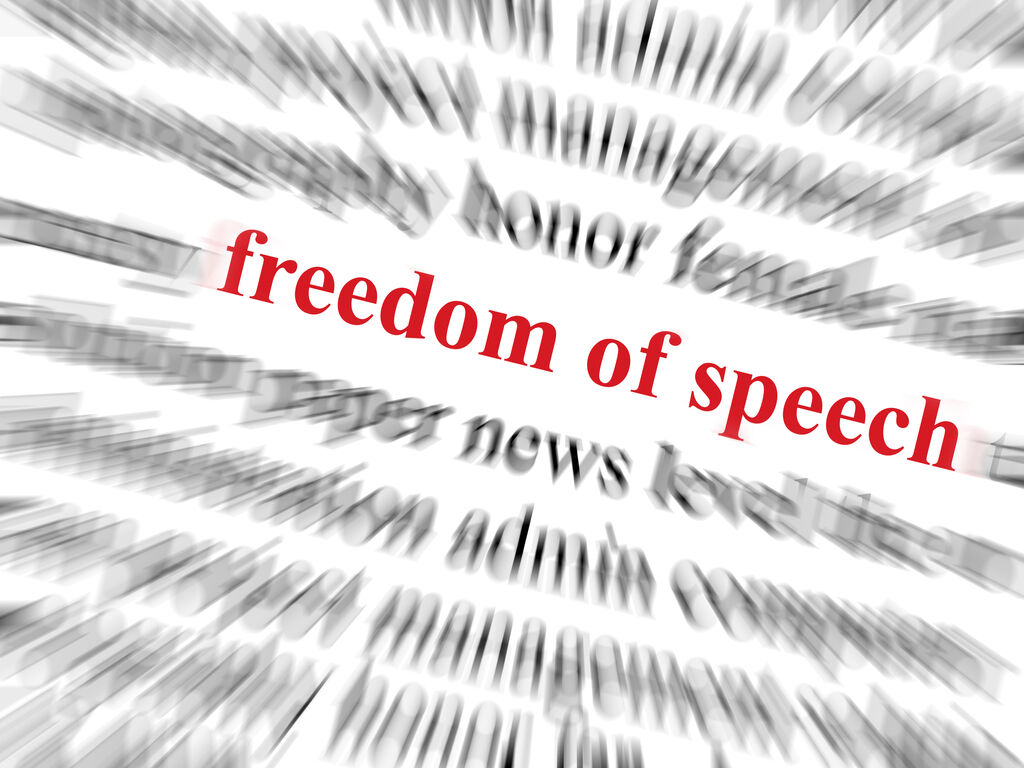The difficulty with free speech

This week we were once again prompted to ask, “how much is too much?” thanks to Laurence Fox and GB News presenter Dan Wootton. Fox, who is no stranger to making headlines for his provocative comments, went beyond his tendency to “sail close to the wind” this week and instead went “way past the limits of acceptance” according to Chief Executive, Angelos Frangopoulos.
During a discussion on Wootton’s show, aired on Tuesday evening, Fox took aim at PoliticsJOE journalist, Ava Evans, for her comments regarding men’s mental health made earlier in the week. Yet his critique went far beyond the content of her argument and instead descended into a personal attack.
"We're past the watershed so I can say this… show me a single, self-respecting man that would like to climb into bed with that woman… ever… ever.
"That little woman has been fed... spoon-fed oppression day after day, after day, starting with the lie about the gender pay gap.
"She's sat there, and I'm going like, if I met you at a bar and that was like sentence three, chances of me just walking away are just huge.
"We need powerful, strong, amazing women who make great points for themselves. We don't need these feminist 4.0.
"They're pathetic and embarrassing. Who'd want to shag that?"
Fox was unchallenged in his comments by presenter Wootton, who appeared to be smirking throughout the interview. Cue the headlines.
As the story has rumbled on throughout the week, there has been justifiable outrage and anger at Fox and Wootton, as well as a broader critique of GB News and its means of operating. Apologies have been made by Wootton, and GB News, as well as Fox, albeit rather belatedly, after his initial declaration that he stood by his comments.
Fox’s statements have been branded “absolutely abhorrent” (Caroline Nokes MP and chair of the women and equalities committee), “unacceptable” (Michelle Donelan MP and Technology Secretary), and “wholly inappropriate” (Richard Tice Reform UK party leader and GB News presenter).
Both Fox and Wootton have been suspended from GB News pending an investigation.
The wider implications
Whilst the incident itself is of a sufficiently toxic nature to dominate the headlines for a week, this forms simply another point of reference in an ongoing society-wide debate on “how much is too much?” That is, what are the limits to free speech? Are there any? If there are, where are they?
Indeed, in his apology Fox himself railed against “a very, very powerful cancel mob” and pushed back against his treatment by GB News arguing:
"GB News have now opened themselves up for complete destruction because they have branded themselves as the home of free speech. They could have said something like what 'Laurence said was appalling but he's got the right to say it'. I know myself I could have expressed it better but to see GB News bow to that cancelling of me and sack us both tomorrow - certainly I think they'll sack me. They are opening themselves up to that cancellation mob which was well whipped up and organised and there has been more suppression of free speech.
"GB News had one opportunity and that opportunity was to stand up and defend free speech which they haven't done. They are actually the home of cancel culture and not of free speech. They're more at risk of cancel culture than any other channel which is so ironic."
GB News have since affirmed their commitment to free speech with presenter Mark Dolan stating, "we have freedom of speech, but not freedom from the fallout" and Chief Executive Angelos Frangopoulos contending, “we are about free speech, but it's about being done in a respectful and proper way, and that was not the way that that conversation played out."
Yet both of these statements seem to concede that there are indeed limits to free speech – either one is constrained by public opinion (Dolan’s comments) or by expectations of decency (Frangopoulos’s comments). All of which poses a difficult question for an outlet committed to free speech – how deep is your commitment?
But perhaps more interesting is that this seems to chime with wider society.
Of course, there are those, and they are a significant group, who believe that untrammelled free speech is an inherent and unimpeachable public good. They argue, not without merit, that to restrict one’s right to say what one wants is a slippery slope because who gets to decide what can and can’t be said, and what’s to say that such restrictions won’t become ever broader, penalising more and more people for a seemingly ever-expanding range of contentious views?
And so, they argue, everyone ought to be able to say what they want, because the alternative is quite simply worse.
For a society which legislates what can, and cannot, be said, is on dangerous ground. We have seen this at play in recent years amidst a variety of debates concerning “hate speech”, regulation of the internet, access to pornography, and counter-terrorism laws to name but a few.
After all, it would make for a rather disturbing society in which it was ok to prosecute people for believing in biological reality, mainstream, centuries-old, orthodox religious belief, or for simply having a contrary opinion to the powers that be.
Now not all of those who find themselves in this camp are as deliberately provocative as Fox, but this view does seem somewhat desirable; but it also seems impractical, when one considers its full implications.
For it would also make for a disturbing society if it was ok to make death threats, if abuse went unchallenged, and if untruths went unchecked.
What the incident this week shows is that the free speech conundrum is significant. The “how much is too much?” question is a tightrope that many have tried to walk, and many have fallen off. People are wary of the dangers of too much and people are equally wary of the dangers of too little.
Ultimately, this is a question our liberal society is unable to answer.
Liberalism’s concern with freedom is the governing cry that occupies our subconscious as individuals and as a wider society at large. Our concerns are with our rights, our freedoms, and our liberties. These can be conceived of negatively, a freedom from persecution, or positively, a freedom to assemble. Either way it is possessing freedom which is the chief concern of the liberal worldview.
Locke conceived of the right to life, liberty, and private property. The founders of the great liberal project that is the United States of America, outlined in the Declaration of Independence the right to life, liberty, and the pursuit of happiness; it is these which largely drive our moral and ethical viewpoint today.
At the heart of the freedom of speech debate are the same concerns around freedom. One side is concerned with whether one is free to speak, and the other with whether one is free from persecution (however loosely that term may now be applied).
But the problem with the liberal project is that it offers no direction as to how these freedoms should be used. As a result, there is little that can be done when rights and freedoms clash, and when these rights and freedoms are misused to impede on the freedoms and rights of others.
Hence, we are locked in a seemingly never-ending battle concerning free speech with two sides that are both strikingly unattractive if one leans too far into them, and yet unhappy with the muddling compromise that we are left with.
A better way
We see in the gospel a beautiful story in which freedom abounds and justice reigns. Throughout the Old Testament we see echoes of the beauty that is to come, whether that be in the liberation of the Israelites from their slavery in Egypt, or in the promises made to Isaiah in which Israel is promised the coming of one who will “open eyes that are blind, to free captives from prison, and to release from the dungeon those who sit in darkness.” (Isaiah 42:7)
In the New Testament we see freedom coming to the fore in the person of Jesus, a man who in one of his first acts of public ministry in Luke, reads out a passage from Isaiah 61 about setting free the imprisoned and giving sight to the blind, and says, “Today this scripture is fulfilled in your hearing.” (Luke 4:20)
And it’s not just mere words: throughout his time on earth Jesus set the imprisoned free. Those who were ensnared by illness were healed. Those who were captured by evil were liberated. And those who were shut out from society were welcomed in.
Jesus came to bring freedom. Paul, in the book of Romans, puts it like this: “For we know that our old self was crucified with him so that the body ruled by sin might be done away with, that we should no longer be slaves to sin— because anyone who has died has been set free from sin.” (Romans 5:6-7)
In Christ’s death and resurrection, he triumphed over the forces of death, he defeated evil, and he liberated those who come to him from the slavery that is sin, the slavery that is the lot of all of us who turn from God.
But what is striking about the gospel is how it differs from the liberal creed that is also concerned with freedom. For liberalism has no comment as to how you should use your freedom, no means of guiding you in what to do with your rights. Jesus, on the other hand, is greatly concerned about our direction of travel as free and forgiven people.
In Galatians 5, we read these words: “You, my brothers and sisters, were called to be free. But do not use your freedom to indulge the flesh; rather, serve one another humbly in love.” (Galatians 5:13) At the heart of the Christian life is freedom, but that freedom has a direction – it is towards love, sacrifice, and service of the ‘other’.
Paul writes something similar in another of his letters, 1 Corinthians. Writing to a church that has fully taken on board the ‘freedom’ theme, Paul urges them to consider why Christ brought them freedom in the first place.
“I have the right to do anything,” you say—but not everything is beneficial. “I have the right to do anything”—but not everything is constructive. No one should seek their own good, but the good of others. (1 Corinthians 10:23-24).
Yes, the gospel makes us free, but that freedom is not for us to use however we see fit. It is not for us to pursue our own selfish ends – rather it is to seek the good of the other. At the heart of the gospel is freedom, but at the heart of that freedom is a love for the other, a concern with that which is good, and a heart for service.
It is this cultural challenge that might offer a path forward for our free-speech conundrum. Yes, we are made for freedom; but it is a freedom that is to be directed towards the good of one other in love.
This is a freedom that looks to the common good, that imposes limits of decency, respect, and love for neighbour, and which calls for integrity, truth, and righteousness from those who are given its gift. It is a freedom that does not abuse its rights to oppress, silence, or demean but which seeks to serve.
Perhaps what our society needs is not to ask “how much is too much”, but rather to ask this: “how do I use my gift of freedom to love my neighbour?”






